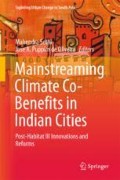Abstract
This chapter assesses the role of the building and construction sector on climate and the environment and the impact of climate friendly policies in achieving co-benefits in Indian cities. The urban climate co-benefits approach may be defined as implementation of climate friendly policies in cities by tackling both global and local environmental problems together while simultaneously contributing to solutions for local development needs. The building and construction sector plays a significant role in creating employment and income and at the same time contributes significantly to greenhouse gas emissions. Hence it offers opportunities for climate co-benefits to reduce GHG emissions, mitigate climate change impact and promote economic growth and employment. The slums and informal housing sector require special attention as it is more vulnerable to climate change impact. The chapter has reviewed Indian policies in the building sector which include the Energy Conservation Act 2001, Energy Conservation Building Code 2007, National Building Code, National Mission for Sustainable Habitat, rating systems for green buildings and so on. The chapter provides a brief assessment of the impact of these policies and makes suggestions for strengthening the same.
References
Bureau of Indian Standards. (2005). National building code of India 2005. New Delhi: Government of India.
GIZ. (n.d.). Promoting sustainable and inclusive growth in emerging economies: Green buildings. Berlin: Economic Policy Forum.
Indian Green Building Council. (2014). IGBC green new buildings rating system version 3.0—Abridged reference guide. New Delhi: Confederation of Indian Industry (CII)-Sohrabji Godrej Green Business Centre.
IPCC. (2007). Intergovernmental panel on climate change. In Climate change 2007: Synthesis report. Climate change—Summary for policy makers. Cambridge: Cambridge University Press.
IPCC. (2014). Summary for policymakers. In O. Edenhofer, R. Pichs-Madruga, Y. Sokona, E. Farahani, S. Kadner, K. Seyboth, A. Adler, I. Baum, S. Brunner, P. Eickemeier, B. Kriemann, J. Savolainen, S. Schlömer, C. von Stechow, T. Zwickel, & J. C. Minx (Eds.), Climate change 2014: Mitigation of climate change. Contribution of working group iii to the fifth assessment report of the intergovernmental panel on climate change. Cambridge University Press, Cambridge, United Kingdom and New York, NY, USA.
Kumar, P., & Sahni, L. (2013). Green buildings in India: A path ahead for sustainable environment. International Journal of Scientific Research, 2(3).
Liu, F., Meyer, S. A., & Hogan, F. J. (2010). Mainstreaming building energy efficiency codes in developing countries: Global experiences and lessons from early adopters. World Bank working paper no 204. Washington, DC: World Bank.
Ministry of Housing and Urban Poverty Alleviation. (2007). National housing and habitat policy 2007. New Delhi: Ministry of Housing and Urban Poverty Alleviation, Government of India.
Ministry of Law, Justice and Company Affairs. (2001). The energy conservation act, 2001. New Delhi: Government of India.
Ministry of Power & Bureau of Energy Efficiency. (2007). Energy conservation building code 2007. New Delhi: Government of India.
Ministry of Power & Bureau of Energy Efficiency. (2008). National mission for enhanced energy efficiency. New Delhi: Draft Mission Document: Implementation Framework, Government of India.
Ministry of Urban Development. (2008). National mission on sustainable habitat. New Delhi: Ministry of Urban Development, Government of India.
MoEF. (2010). India: Greenhouse gas emissions 2007 (pp. 1–54). New Delhi: Indian Network for Climate Change Assessment, Ministry of Environment & Forests, Government of India.
MoEF. (2015). India’s intended nationally determined contribution: Working towards climate justice. New Delhi: Ministry of Environment & Forests, Government of India.
NAPCC. (2008). National action plan for climate change 2008. New Delhi: Ministry of Environment and Forests, Government of India.
Narender, A. (2013). Towards slum free cities in India: policies and issues. Nagarlok, 45(4), 12–40.
Planning Commission. (2006). Integrated energy policy: Report of the expert committee. New Delhi: Planning Commission, Government of India.
Puppim de Oliveira, J. A., Doll, C. N. H., & Suwa, A. (2013a). Urban development with climate co-benefits: Aligning climate, environmental and other development goals in cities (pp. 10–17). Yokohama: United Nations University Institute of Advanced Studies (UNU-IAS), Japan.
Puppim de Oliveira, J. A., Doll, C. N. H., Kurniawan, T. A., Geng, Y., Kapshe, M., & Huisingh, D. (2013b). Promoting win–win situations in climate change mitigation, local environmental quality and development in Asian cities through co-benefits, Journal of Cleaner Production, 58(1), 1–6.
United Nations Environment Programme. (2007). Buildings and climate change: Status, challenges and opportunities. Nairobi, Kenya: UNEP.
United Nations Environment Programme. (2009). Buildings and climate change: Summary for decision-makers. Nairobi, Kenya: UNEP-SBCI, Sustainable Buildings and Climate Initiative.
United Nations Environment Programme. (2010). The ‘state of play’ of sustainable buildings in India. Nairobi, Kenya: UNEP-SBCI, Sustainable Buildings and Climate Initiative.
UN Habitat. (2011). Global report on human settlements 2011: Cities and climate change. London, Washington, DC: United Nations Human Settlements Programme & Earthscan.
United Nations. (2015a). Transforming our world: The 2030 agenda for sustainable development, A/RES/70/1. https://sustainabledevelopment.un.org/post2015/transformingourworld/publication. Accessed on December 15, 2015.
United Nations. (2015b). Conference of parties, December 2015, FCCC/CP/2015/L.9. United Nations Framework Convention on Climate Change. http://unfccc.int/resource/docs/2015/cop21/eng/l09.pdf. Accessed on January 24, 2016.
URDPFI. (2014). Urban and regional development plans formulation & implementation guidelines, volume 1-first draft report. New Delhi: Ministry of Urban Development, Government of India.
World Bank. (2011). Guide to climate change adaptation in cities. Washington, DC: World Bank.
World Health Organization. (2011). Health in the green economy: Health co-benefits of climate change mitigation—housing sector. Geneva, Switzerland: World Health Organization.
Yu, S., Evans, M., & Delgado, A. (2014). Building energy efficiency in India: Compliance evaluation of energy conservation building code. Oak Ridge, USA: Pacific Northwest Laboratory & U.S. Department of Energy.
Author information
Authors and Affiliations
Corresponding author
Editor information
Editors and Affiliations
Rights and permissions
Copyright information
© 2018 Springer Nature Singapore Pte Ltd.
About this chapter
Cite this chapter
Narender, A. (2018). Co-benefits from Buildings and Construction. In: Sethi, M., Puppim de Oliveira, J. (eds) Mainstreaming Climate Co-Benefits in Indian Cities. Exploring Urban Change in South Asia. Springer, Singapore. https://doi.org/10.1007/978-981-10-5816-5_7
Download citation
DOI: https://doi.org/10.1007/978-981-10-5816-5_7
Published:
Publisher Name: Springer, Singapore
Print ISBN: 978-981-10-5815-8
Online ISBN: 978-981-10-5816-5
eBook Packages: Earth and Environmental ScienceEarth and Environmental Science (R0)

